|
|
|
Sort Order |
|
|
|
Items / Page
|
|
|
|
|
|
|
| Srl | Item |
| 1 |
ID:
089088
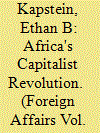

|
|
|
|
|
| Publication |
2009.
|
| Summary/Abstract |
In one of the great ironies of history, Africa may well emerge from the current global recession as the only region in the world that remains committed to global capitalism. While the tired industrialized nations of the West are nationalizing their banks and engaging in various forms of protectionism, Africa remains open for business -- promoting trade, foreign direct investment, and domestic entrepreneurship. Analysts in the industrialized countries are concerned that foreign aid flows to Africa might drop because of the recession, but Africans themselves are much more worried about rising barriers to their exports and diminishing private investment from abroad, which could impede the continuation of the impressive economic progress the continent has made over the past decade.
|
|
|
|
|
|
|
|
|
|
|
|
|
|
|
|
| 2 |
ID:
021619
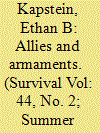

|
|
|
|
|
| Publication |
2002.
|
| Description |
141-155
|
|
|
|
|
|
|
|
|
|
|
|
|
|
|
|
| 3 |
ID:
114128
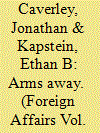

|
|
|
|
|
| Publication |
2012.
|
| Summary/Abstract |
For two decades, the United States has dominated the global arms trade, reaping a broad range of economic and geopolitical benefits in the process. But shortsighted decisions to produce expensive, cutting-edge weapons systems, rather than cheaper, more practical ones, are squandering this monopoly and letting other countries get into the market.
|
|
|
|
|
|
|
|
|
|
|
|
|
|
|
|
| 4 |
ID:
053733
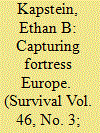

|
|
|
|
|
| Publication |
2004.
|
| Description |
p137-160
|
| Summary/Abstract |
By taking the route of international collaboration in developing and building its most advanced fighter aircraft, the Joint Strike Fighter (JSF), the US Department of Defense was seeking to ensure foreign market share, particularly in western Europe. Given the sharply falling weapons procurement budgets of the 1990s, these markets were deemed critical to the financial health of the American defence industrial base. The price of capturing those markets, however, could be high in terms of work-share and technology transfer to foreign industries and governments. The costs and benefits of international arms collaboration – specifically, the economic and security implications – need to be subject to more intensive policy analysis and public debate.
|
|
|
|
|
|
|
|
|
|
|
|
|
|
|
|
| 5 |
ID:
082831
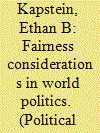

|
|
|
|
|
| Publication |
2008.
|
| Summary/Abstract |
Ethan B. Kapstein argues that in recent years a growing number of activists, scholars, and policymakers have claimed that the global economy and, specifically, the current international trade regime have been "unfair" to the developing countries. He concludes that, while the trading system can hardly be considered a level playing field for each and every state, fairness considerations do appear to play a role in shaping trade agreements
|
|
|
|
|
|
|
|
|
|
|
|
|
|
|
|
| 6 |
ID:
188004


|
|
|
|
|
| Summary/Abstract |
The Syrian Civil War represents an extreme outlier in terms of the number of insurgent groups which have been engaged in the fighting. These groups have also been remarkably persistent over time, partly due to the fact that rebel in-fighting has been relatively contained. They have also targeted civilians far less than the Syrian Army. These stylized facts run counter to much of the existing literature on multi-party civil wars, which has emphasized the influence of the balance of power on group dynamics. In this article we instead draw upon balance of threat theory, along with insights from the economics of industrial organization, to understand insurgent behavior in the Syrian Civil War, based on a newly compiled dataset of rebel violence. Our research suggests that conflict scholars need to account for factors beyond the balance of power if they are to adequately explain inter-rebel dynamics.
|
|
|
|
|
|
|
|
|
|
|
|
|
|
|
|
| 7 |
ID:
128846
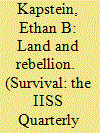

|
|
|
|
|
| Publication |
2014.
|
| Summary/Abstract |
A study of land reform illuminates the paradox of economic instruments in counter-insurgency. Where redistributive demands are at the core of a rebellion, foreign powers will find it difficult to respond effectively. Recent years have seen the United States and its allies embroiled in major counter-insurgency campaigns in Afghanistan and Iraq, and lesser operations in such countries as Yemen and Somalia. These battles against local insurgencies are only the latest in a string of such conflicts that have erupted in nearly every developing region since the end of the Second World War. Sharply debated at home and abroad, they raise the fundamental question of what the counter-insurgents can reasonably hope to achieve in violent settings, even when they deploy an array of military, political and economic instruments. What are the 'moving parts' that foreign powers can manipulate in their efforts to force or encourage violence-reducing reforms in these societies?
|
|
|
|
|
|
|
|
|
|
|
|
|
|
|
|
| 8 |
ID:
110304
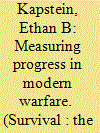

|
|
|
|
|
| Publication |
2012.
|
| Summary/Abstract |
How do governments know whether they're winning or losing a military campaign? This question is devilish enough to answer in the context of conventional wars with pitched battles, let alone the ebb and flow of a long-term counter-insurgency. There is considerable confusion both over what sort of indicators - 'military metrics' - might be useful, and over how they should be used. Although reams of data are currently being collected and reported in Afghanistan and other conflict zones, for example, it is difficult to draw any meaningful conclusions about what, if any, progress is being made.
|
|
|
|
|
|
|
|
|
|
|
|
|
|
|
|
| 9 |
ID:
074938
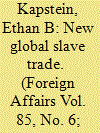

|
|
|
|
|
| Publication |
2006.
|
| Summary/Abstract |
Most people think of slavery as a purely historical phenomenon. In fact, the practice thrives around the world today. The same factors that contribute to economic globalization have given rise to a booming international traffic in human beings, often with the connivance of national governments. Fighting this scourge successfully will take more than another UN treaty: Western nations must use their military might.
|
|
|
|
|
|
|
|
|
|
|
|
|
|
|
|
| 10 |
ID:
146202


|
|
|
|
|
| Summary/Abstract |
When AIDS activists launched their campaign for developing world access to antiretroviral therapy in the late 1990s, this treatment cost on average $10,000 per patient per year. More than a decade later, drug prices for “first line” therapies hovered around $100 per patient per year, and nearly 13 million people in low- and middle-income countries were receiving these life-extending medications. By contrast, climate activists during the same time period labored without much success in establishing mechanisms to put a price on carbon. We identify the global market structures most conducive for social movement-led market transformations. We argue that advocacy collective action is more likely to be successful when the global market structure involves (i) a small number of product markets, (ii) globally integrated product markets, (iii) a relatively concentrated industry with few producers or buyers, and (iv) a source of rents produced through social construction rather than natural or technological barriers to entry.
|
|
|
|
|
|
|
|
|
|
|
|
|
|
|
|
| 11 |
ID:
144111
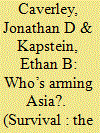

|
|
|
|
|
| Summary/Abstract |
In the international arms trade, as in any industry, market share is power. But unlike most other products, when it comes to the sale of weapons, power is not limited to economics. Arms exports not only benefit producers (and, sometimes, defence ministries) financially; they also cement relationships (often asymmetric, and occasionally coercive) between seller and client.
|
|
|
|
|
|
|
|
|
|
|
|
|
|
|
|
|
|
|
|
|